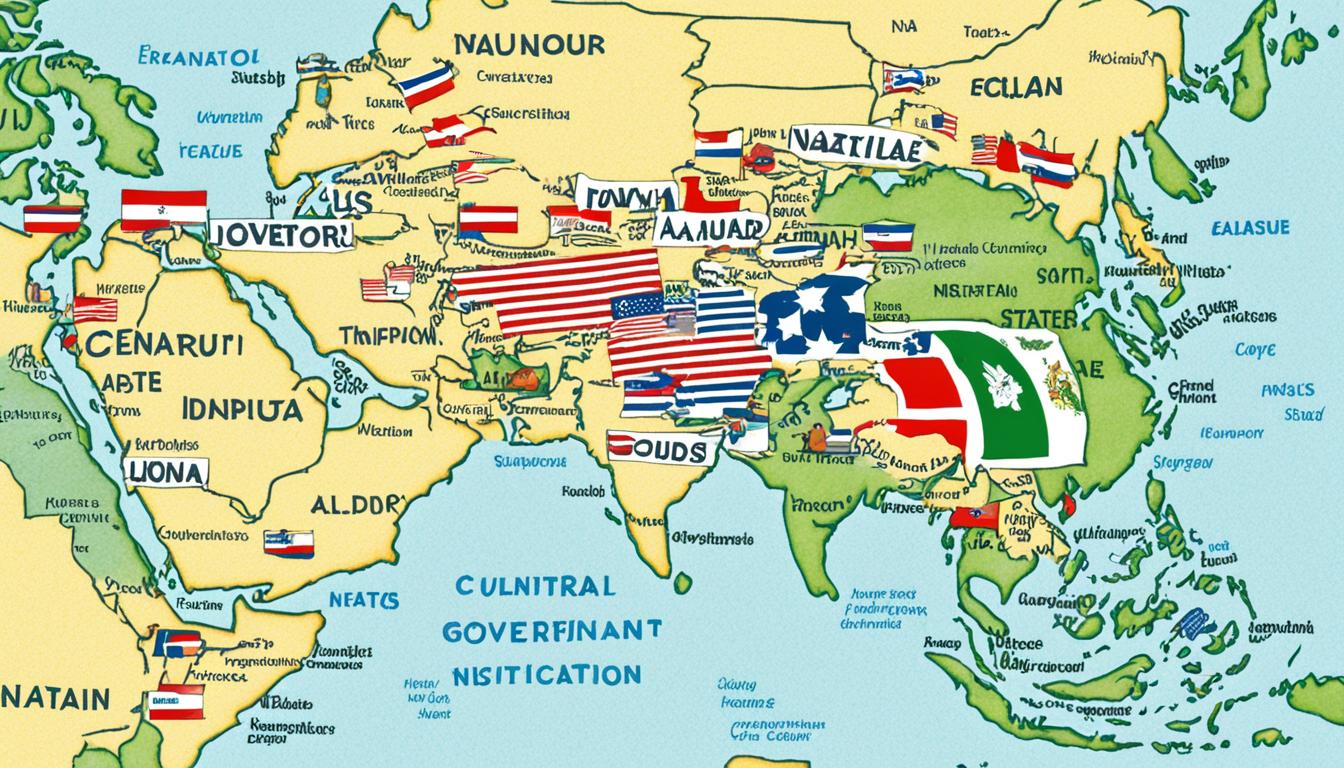Discovering the fundamentals of nation state within the framework of political geography unfolds as we delve into the intricacies of the AP Human Geography guide. The concept of a nation state is pivotal to understanding the fabric of political territories and the cultural identity that defines them. This introduction into political geography will arm you with the knowledge needed to comprehend the sovereignty, borders, and governance that constitute the essence of a nation state.
Key Takeaways
- Grasp the clear-cut definition and characteristics of a nation state in relation to political geography.
- Understand the historic development of states and the paramount role sovereignty plays within them.
- Analyse the geopolitical landscape through the lens of border disputes and territoriality.
- Explore the various functions and differences of central governments in both unitary and federated systems.
- Learn how the concept of a nation state serves as a cornerstone in the study of AP Human Geography.
Understanding the Nation State in Political Geography
The concept of a nation state is pivotal in the study of political geography, serving as the basis for understanding many geopolitical dynamics of the world. This section provides a comprehensive examination of nation-state characteristics, the intricate process of state development, and the pivotal role of sovereignty in shaping nations. Furthermore, it delves into the complexities of border disputes and territoriality, as well as how a central government operates within unitary and federated systems.
Defining the Nation State and Its Characteristics
A nation state is a form of political organization that unites a group of people under a single government with a shared sense of identity, culture, language, and delineated territory. The attributes that define a nation state are deeply interwoven with the human experience and personal identity, which when combined, foster a sense of unity and common purpose.
- Shared Identity: A nation state’s populace typically identifies with a common ethnic or cultural heritage.
- Central Government: Effective governance is administered by a sovereign authority that oversees the nation state’s territory and population.
- Defined Territory: The geographical boundaries of a nation state are internationally recognized.
- Sovereignty: Self-governance and the freedom to operate without external interference solidify a nation state’s autonomy.
The Development of States and the Role of Sovereignty
State development is a multifaceted process influenced by historical, economic, social, and political factors. The principle of sovereignty is imperative for a state’s ability to function independently, making it a foundational element of international law and diplomacy. Sovereignty means absolute authority within a territory, a crucial aspect for a nation state to influence its domestic and international affairs.
Border Disputes and Territoriality: A Geopolitical Analysis
Border disputes arise when two or more nation states claim jurisdiction over a specific region, leading to conflicts over resource allocation, control, and political influence. Territoriality, the expression of sovereignty over a space, is often at the heart of these disputes. Political geography attempts to analyze and resolve such contentious issues through diplomatic dialogues and international legal frameworks.
Central Government and Its Functions in Unitary and Federated Systems
The central government of a nation state is instrumental in forming policies and maintaining order. In a unitary system, all governmental authority resides at the center, offering uniformity but sometimes lacking local responsiveness. In contrast, a federated system divides power between the central government and constituent political units, providing a balance between national cohesion and regional autonomy.
| System Type | Central Government Authority | Local Autonomy |
|---|---|---|
| Unitary System | Concentrated Power | Limited |
| Federated System | Distributed Power | Significant |
What is a Nation State in AP Human Geography?
Within AP Human Geography, the term nation state denotes a specific type of political entity that combines the concepts of a ‘nation’ and a ‘state’. A nation-state is often characterized by a contiguous territorial area, a stable population, a government, and a significant degree of sovereignty.
The nation-state definition clarifies that it is a political unit where the cultural boundaries match up with the political boundaries. The ideal form is that the citizens of a nation-state share a common culture, language, and identity which contribute significantly to the unification of the state. This article will dissect the key nation-state characteristics crucial for understanding its prominence within AP Human Geography.

Moreover, nation-states play a pivotal role in political geography, which studies how political processes are affected by spatial structures. In examining the nation state through the lens of AP Human Geography, one must consider how historical events, governance policies, and geographical localities shape the development of a nation-state.
| Characteristic | Description | Significance in AP Human Geography |
|---|---|---|
| Defined Territory | A clear and recognized border. | Understanding the spatial demarcations of state boundaries is essential in political geography. |
| Permanent Population | Stable inhabitants that reside long-term in the state. | Population analyzes demonstrate how demographic patterns influence political policies. |
| Government | An organized system to implement policies and laws. | Examining different governance structures helps understand variations in power distribution. |
| Sovereignty | The ability to rule without external interference. | Sovereignty is crucial for autonomy and control, a core concept in geopolitical studies. |
| Cultural Homogeneity | A degree of uniformity in language, religion, and ethnicity among citizens. | Assesses the impact of cultural factors on state cohesion and identity formation. |
In conclusion, the nation-state serves as a fundamental building block in the studies of AP Human Geography. By inspecting nation-state characteristics, scholars can garner keen insights into how geographical and human elements coalesce to shape geopolitical landscapes across the globe.
Impact of Political Theories on the Concept of a Nation State
The idea of a nation state is deeply rooted in political theories that have long influenced its evolution. Nation-building, a process that ties the identity of citizens to the sovereignty of the state, has been integral to the formation of nation states. This complex undertaking involves the integration of diverse groups under a single national narrative, often facilitated by shared language, culture, or ideology. These efforts not only solidify internal unity but also delineate the state’s unique imprint in the global political landscape.
Nationalism, as both a sentiment and a political theory, has significantly shaped the concept of a nation state. Nationalism instigates a collective sense of belonging and pride among citizens, further legitimizing the nation state’s claim to autonomy and self-determination. This emotional connection to the nation serves as a powerful unifier, particularly visible in periods of state formation, or when the sovereignty of a state faces external threats. The nexus of nationalism and the emergence of modern nation states has forged bonds that withstand the convolutions of international relations and internal division.
Central to this discourse is the notion of sovereignty, a cornerstone of political theories concerning the nation state. Sovereignty offers nation states the legitimacy to exercise ultimate authority over their territory and insulates them from undue external influence. The embrace of sovereignty as a political value underscores a nation state’s quest for control, embodying the principles of self-governance and independence that are critical to state functionality. Exploring these political theories unveils a multifaceted narrative of how they have variously contributed to the nation state’s persistence as a dominant entity in the landscape of political geography.





